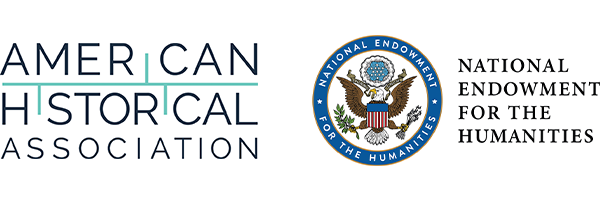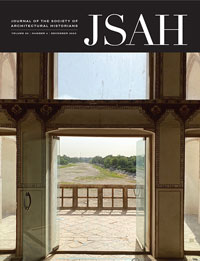-
Membership
Membership
Anyone with an interest in the history of the built environment is welcome to join the Society of Architectural Historians -
Conferences
Conferences
SAH Annual International Conferences bring members together for scholarly exchange and networking -
Publications
Publications
Through print and digital publications, SAH documents the history of the built environment and disseminates scholarship -
Programs
Programs
SAH promotes meaningful engagement with the history of the built environment through its programsMember Programs
-
Jobs & Opportunities
Jobs & Opportunities
SAH provides resources, fellowships, and grants to help further your career and professional life -
Support
Support
We invite you to support the educational mission of SAH by making a gift, becoming a member, or volunteering -
About
About
SAH promotes the study, interpretation, and conservation of the built environment worldwide for the benefit of all
Charnley-Persky House Awarded Pandemic Recovery Grant from the American Historical Association
Mar 29, 2022
by
SAH News
CHICAGO, March 29, 2022 — The Charnley-Persky House Museum Foundation has been awarded funding from the American Historical Association’s Grants to Sustain and Advance the Work of Historical Organizations Program for the project The City Beyond the White City: Race, Two Chicago Homes, and their Neighborhoods. The AHA grant provides relief to institutions adversely affected by the COVID-19 pandemic. This opportunity was made possible with support from the National Endowment for the Humanities (NEH) through the American Rescue Plan Act of 2021
Pauline Saliga, executive director of both the Society of Architectural Historians and the Charnley-Persky House, commented, "We are very grateful to AHA for providing funding to complete an exhibit featuring historic photographs, maps, music, and 19th-century objects that were unearthed in two archaeological digs at Charnley-Persky House and Mecca Flats in the 2010s. Co-curated by Dr. Rebecca Graff, Associate Professor of Anthropology at Lake Forest College, and myself, this exhibit is a springboard for discussing how structural racism has shaped Chicago's built environment. We also intentionally planned accompanying online programs and educational resources so teachers, students and public audiences everywhere can easily access this interpretation of Chicago's history."
The project is a physical and online exhibit, with virtual programming, that explores the history of race and the built environment in Chicago through the 1893 Worlds' Columbian Exposition and two 1892 home sites. The first homesite is the Charnley-Persky House (Adler and Sullivan, with Frank Lloyd Wright), an elite white residence in Chicago’s Gold Coast long studied for its architectural significance as an example of Louis Sullivan’s and Frank Lloyd Wright’s residential designs. The second homesite, located in Chicago’s Near South Side, is Mecca Flats (Edbrooke and Burnham), which was built to house attendees of the 1893 World’s Columbian Exposition. Later, it became a center of the Black Metropolis during the Great Migration (1915–1970) and was demolished in 1952 via urban renewal and its concomitant structures of racism. Scheduled to open in September 2022, the exhibition will bring together documents, oral histories, and 19th- and early 20 th-century artifacts unearthed in archaeological digs at the Charnley-Persky House and Mecca Flats to interpret a nuanced public history of race and place in Chicago for student and public audiences.
The Charnley-Persky House is one of fifty grant recipients, which include site-based organizations, membership associations, and history departments at Historically Black Colleges and Universities. To learn more about the Charnley-Persky House’s grant project and for the full list of recipients, please visit the AHA website.

ABOUT THE CHARNLEY-PERSKY HOUSE MUSEUM FOUNDATION
The National Historic Landmark Charnley-Persky House, designed by Adler and Sullivan with Frank Lloyd Wright (1891–1892), is recognized as a pivotal work of modern American residential architecture. Located in Chicago’s Gold Coast neighborhood, the building welcomes local, national, and international visitors throughout the year through guided tours and public programs. The house serves as the international headquarters of the Society of Architectural Historians.
ABOUT THE AMERICAN HISTORICAL ASSOCIATION
Founded in 1884 and incorporated by Congress in 1889 for the promotion of historical studies, the American Historical Association provides leadership for the discipline and promotes the critical role of historical thinking in public life. The Association defends academic freedom, develops professional standards, supports innovative scholarship and teaching, and helps to sustain and enhance the work of historians. As the largest membership association of professional historians in the world (nearly 12,000 members), the AHA serves historians in a wide variety of professions and represents every historical era and geographical area.
ABOUT THE NATIONAL ENDOWMENT FOR THE HUMANITIES
Created in 1965 as an independent federal agency, the National Endowment for the Humanities supports research and learning in history, literature, philosophy, and other areas of the humanities by funding selected, peer-reviewed proposals from around the nation. Additional information about the National Endowment for the Humanities and its grant programs is available at www.neh.gov.
PRESS CONTACT
Helena Dean, hdean@sah.org
Director of Communications
Society of Architectural Historians


